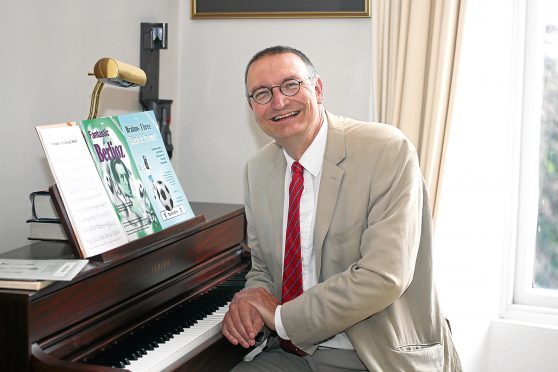Each week, we ask small businesses key questions.
Here we speak to Mark Goddard, who runs Spartan Music Publishers in Kingussie.
How and why did you start in business?
My wife, Pat, and I met as students at the Royal Academy of Music in London and then began pursuing busy freelance careers as musicians and teachers in Oxford.
As we were later to discover, this proved to be an excellent training ground for running an educational music publishing company.
After 10 years we both fancied a change. In particular, I wanted to be able to immerse myself in a world that I love, classical music, while working from home and seeing the kids grow up.
Some people might see this as having my cake and eating it, but I thought it perfectly feasible.
Our idea was simple: to compose music, typeset it, print it and sell it under our Spartan Press label.
Alness entrepreneur says small businesses should be given more respect and support
Since then, the business model has widened and we now also publish the music of many other composers, while exclusively distributing for two dozen other small, like-minded publishers.
We bought an old brewery in Monmouthshire and ran Spartan from there for seven years until 1999, when we relocated to Strathmashie House in Laggan.
The business finally came of age in 2015, when we moved to a large industrial unit in Kingussie. Meanwhile, the family evolved – Tess was born in England, George in Wales and Rose in Scotland.
How did you get to where you are today?
Spartan Press has developed very gradually over nearly 30 years. We have felt our way cautiously to ensure that the business’s foundations and superstructure remain solid, but that does not mean that we have been frightened to seize opportunities. Luck doesn’t come knocking – you have to make your own.
While we have sometimes been in the right place at the right time, we have manufactured or created many more opportunities by working incredibly hard and getting out into the market.
The niche business we are in does not generate megabucks but, thanks to the wide variety of fascinating and challenging activities that we engage in, it does offer immense fulfilment.
Who helped you?
Membership of the Federation of Small Businesses has been of great benefit over the years, particularly the legal advice and support which is always there when needed.
Our bank, Barclays – so often seen as the bad guys these days – has been a pillar of help throughout. Indeed, without its support we would have got precisely nowhere.
However, the biggest help and support — all I could ever wish for – comes from my loving and utterly supportive wife, Pat: a best friend and soulmate – and a red-hot musician to boot.
What has been your biggest mistake?
I don’t think we’ve made any humongous mistakes or we probably wouldn’t still be in business. We prefer to call day-to-day mistakes “learning experiences”.
What is your greatest achievement?
The business is on a high and we are getting older, so Pat and I feel that now is a good time to pass the reins on. We are about to step sideways and hand Spartan Press to new owners, Dave and Claire Candy. We will still be involved initially but the business will be theirs.
I get a real kick from the knowledge that we have raised a family, successfully created lasting, quality employment in Badenoch and Strathspey, and nurtured the talents of hundreds of composers, arrangers and music teachers worldwide – all on the back of Spartan Press.
If you were in power in government, what would you change?
I’d provide much greater support for education generally, particularly for the arts and specifically for music, of course.
What do you still hope to achieve?
The best possible transition in ownership. Pat and I want to pass “our baby” over to Dave and Claire as carefully and seamlessly as possible.
We’re not just handing the keys over and walking away, but providing a full stewardship of help and support as required, including documentation in various forms: written, electronic and videographic.
One of the main assets of the company is our repository of hundreds of print titles, unique to Spartan, held as electronic files.
These require consolidating to make sure Spartan’s wealth of artwork is compatible with current printing standards.
Conceivably, virtually every printed title in the catalogue could also exist in a downloadable form for customers to buy online. There are still lots of challenges in this exciting, fast-changing business sector.
What do you do to relax?
Walk dogs, play cricket and drink real ale.
What are you currently reading, listening to or glued to on the TV?
I’m currently hooked on reading the novels by Thomas Hardy – our eldest daughter is, coincidentally, called Tess.
What do you waste your money on?
We’ve got three dogs – a St. Bernard, a Newfoundland and and a collie. They are not cheap to run but terrific value for money.
How would your friends describe you?
Autocratic and eccentric. Us composers have to maintain our image somehow.
What would your enemies say about you?
Opportunistic and controlling perhaps.
What do you drive and dream of driving?
I drive a Volvo Estate (XC70). It’s the dream car for a man with a family and dogs.
